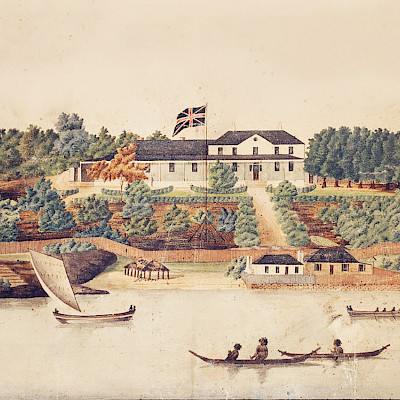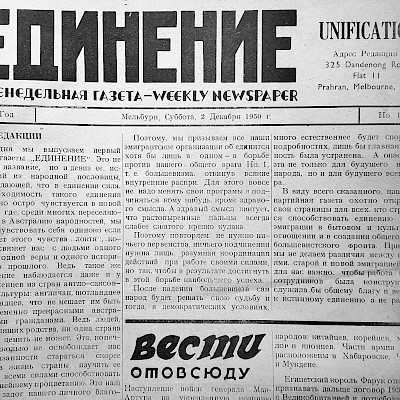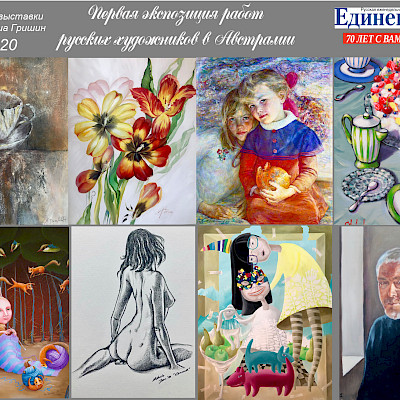3 сентября торжественным обедом в сиднейском Русском клубе в Стратфилде более 280 человек отметили бриллиантовый юбилей приезда в Австралию большой группы русских из Китая. Это было не ординарное событие, я уверен, встречу участники будут помнить многие годы. На неё собрались не только жители Сиднея, но и гости из Мельбурна, Брисбена, Канберры и Аделаиды.
Несмотря на то, что прошло уже 60 или больше лет с тех пор, любовь к периоду молодости в Китае сохранилась у них на всю жизнь. Большая часть гостей родились в русском Харбине и его окрестностях, другие в Шанхае, Трехречье или других местах, где в первой половине прошлого века жили более сотни тысяч русских людей, оказавшихся там либо во время строительства КВЖД в начале века, либо ушедшие вместе с Белой армией из Сибири и Дальнего востока в Китай после гражданской войны. Русские смогли создать в Харбине уникальный город, островок старой России. Здесь были открыты более 20 русских храмов, работали школы, институты, театры, литературные общества. Как писал один из священников «Милостью Божией Харбин на четверть века продолжил нормальную дореволюционную русскую жизнь». После Второй мировой войны, русским пришлось покинуть эти места, многие разъехались по всему миру, большую группа беженцев приняла доброжелательная Австралия. Многие осели в Сиднее. И вот, спустя многие десятилетия, здесь не редкость встречи
На нынешней встрече в Русском клубе, которая была организована по инициативе Игоря и Аллы Савицких, собрались люди разных поколений.
На встречу была приглашена теневой министр правительства Нового Южного Уэльса Татьяна Михайлюк, чьи родственники по линии отца приехали после войны из Китая. Она тепло поздравила гостей и поблагодарила организаторов. Присутствовал на встрече и посол России Григорий Семенович Логвинов с супругой. В своем выступлении посол оценил большой вклад харбинцев в развитие русской общины в Австралии. «Еще готовившись к приезду в Австралию, — рассказал Григорий Семенович, — я узнал, что значительную часть российской общины составляют выходцы из Харбина, но тогда я не понял, что за этим стоит. Через год после приезда, познакомившись с вами, вашей жизнью и историей, я понял, что произносить и писать это слово, харбинцы, здесь нужно с большой буквы. Для меня теперь харбинец — это синоним высоты духа и русского патриотизма в его исконном понимании и значении, которое не подразумевает автоматической лояльности тому или иному политическому режиму». Завершил свое выступление Григорий Семенович
Организаторы встречи не планировали большой официальной части, поскольку в программу встречи, которую вела Татьяна Гартунг, входила концертная программа и веселые короткие кинозарисовки.
Известные музыканты и педагоги Светлана Задорина и Татьяна Ребикова исполнили несколько музыкальных произведений. Светлана прекрасно сыграла и спела о Харбине и песню на китайском языке, а Татьяна покорила всех аргентинскими танго, которые не выходят из моды уже многие десятилетия. Тепло встретили гости выступление солистов оркестра «Балалайка» Софии Марковцевой и Владимира Шведова вместе с аккордеонистом Ричардом Ши и Михаилом Тетериным (фортепиано). Один из организаторов встречи, Елена Иванцова прочитала стихотворение, написанное ей 60 лет назад, как оказалось, И. Савицким. А Ирина Аполлонова прочитала стихотворение Елены Недельской о Харбине.
Интересную выставку фотографий подготовил Иннокентий Суворов. Рассматривая виды современного и старого Харбина, многие участники встречи вспоминали далекие годы, узнавали знакомые места, где они жили, учились и отдыхали. Подготовили организаторы и песенник, включавший слова любимых мелодий того времени, которые запевали гости с разных столов и дружно подтягивали в зале. Уделил немало времени и созданию сувенирной брошюры, в которой была собрана историческая информация о приезде русских из Китая в послевоенный период, а также представлен список русских, награжденных австралийскими и российскими наградами. В конце встречи на сцену были приглашены все, кто помогал её организовать.
Смех и улыбки, радость и слезы, грустные моменты, ведь многих из старых друзей уже нет — все это перемешалось в зале и создало то особое неповторимое настроение, которое бывает на встречах в большой семье. Только в этой семье, а именно так многие участники воспринимали эту встречу, было около трехсот человек, заполнивших все возможные места в зале Русского клуба. Дополнительные столы, чтобы разместить всех желающих, пришлось ставить уже практически в коридоре.
Наталья Мельникова много лет преподавала русский язык в университете и собрала коллектив творческих харбинцев, более20 лет выпускавших журнал «Австралиада», который собирал летопись жизни русских в Австралии.
— Прошло 60 лет, а харбинцы еще помнят это время. Помнят и то, какой блестящий и цветущий город построили русские люди в Маньчжурии. И что этот город дал им, и что, между прочим, Харбин и его население дали Китаю для поднятия дикой маньчжурской степи. Конечно, встреча была очень приятной, поскольку около 280 человек собралось, и все почувствовали, что очень мало встречаются. На будущий год будет
В зале я заметил большую группу людей, которая собралась для фотографии. Виталий Тетерин рассказал, что это харбинцы, которые пошли в первый класс в 1952 году.
— Насколько важна такая встреча для людей, у которых общая родина, общее детство.
— Это как семья, где бы мы ни встречались, мы ощущаем себя большой семьей. Одну из учениц я не видел 40 лет. А сейчас встретились, как будто это было вчера, как будто мы никогда не расставались.
— А наши одноклассники в следующем году будут отмечать 60 лет выпуска, — добавляет Наташа Суворова. — Это наши корни, мы дружбу держим все время. Виталий, как и мой брат, был в скаутах. Все были еще мальчишки и девчонки.
— Я из Харбина, там родился, — говорит Герман Суходолов.- Я здесь знаю половину людей. Сейчас, в нашем возрасте собираемся маленькими группами, и то, что сегодня была возможность увидеть сразу столько знакомых — это замечательно. Повезло нам.
— Я, наверное, самая старая здесь, мне 90 лет, — сообщила Лидия Савва.
Но оказалось, это не совсем верно. На встречу приехала Калерия Михайловна Авраменко, она свое
Валерия Волтеринг живет в Мельбурне, по делам приехала в Сидней и очень рада, что была возможность попасть на встречу.
— Я встретила здесь много своих одноклассников. Я нашла и специально надела на встречу этот жакет, ему 60 лет. Только он не сходится уже, мы изменились за это время. Когда выходишь замуж — у вас другая семья, другие интересы. Поэтому многие разошлись, а сегодня все вместе и это меня радует.
Я побеседовал на встрече с поколением, приехавшим в Австралию в детском возрасте.
— Для старшего поколения — конечно много связано с Харбином, но вы приехали в Австралию еще совсем детьми. Насколько важен этот период для вас?
— Я приехала на встречу вместе со своим папой,- говорит Ирина Райн, директор русской школы. — Для него очень важно увидеться со своими знакомыми, учениками — лицеистами из Харбина. И из нашего поколения я вижу своих знакомых, учениц из русской
— Для меня это важно, поэтому я и пришла сегодня на эту встречу, — отметила Ольга Прокопович (Wynn).- Я немного удивилась, что здесь собралось не так много людей нашего поколения.
— Ольга, я видел ваше имя в списках награжденных австралийской наградой, приведенных в брошюре, изданной к этой встрече. Чем вы занимались в Австралии?
— Я 30 лет работала в иммиграционном министерстве и открыла иммиграционный отдел в нашем посольстве в Москве в конце 80 — начале
— Я недавно побывала на конференции в Харбине, — рассказывает Мара Мустафина.- Для меня важно, что все харбинцы поддерживают русскую культуру и не растеряли свои связи с прошлым. Иногда когда подросшее молодое поколение хочет узнать историю их семей, это оказывается слишком поздно. Но с помощью людей, живших вместе с вашими родственниками, можно узнать много интересного об этом периоде, наши корни.
У многих это (интерес к своим корням, ред.) еще не зажглось. Старое поколение — оно в мыслях еще живет в Харбине. Мы первое выросшее здесь поколение уже перерабатываем это в другой форме. Я считаю себя австралийкой, но все равно связь с русской культурой и Китаем очень важна для меня. И этот юбилей, это связь с жизнью наших родителей и тем, что мы помним из своего детства.
— Чем вы сейчас занимаетесь?
— Я много лет работала дипломатом в Азии. Сейчас работаю в Административном апелляционном трибунале. Еще один интересный проект, над которым я работаю, вместе с профессором Сиднейского университета, о русских, приехавших в Австралию после Второй мировой войны из Китая.
— Мара, несколько лет назад вы написали книгу, которая получила награду премьера НЮУ.
— Secrets and Spies: Harbin Files была написана в 2003 году. Эту книгу я написала на основе архивов, полученных из НКВД, о том, что случилось с семьей моей бабушки, которая вернулась в
— По поводу, того кто мы, русские или австралийцы, я и некоторые мои друзья говорим — мы русские с австралийским гражданством, — высказывает свое мнение Марианна Косицына.- Я недавно побывала в России, и для меня это были встречи с моими истоками, с корнями мой семьи.
Это была первая встреча в Русском клубе Сиднея, на которой праздничный обед готовила команда ресторана Coachman Андрея Савельева. Андрей рассказал, что их пригласили помочь, чтобы людям было приятно приходить в клуб пообщаться.
— Ну, а за хорошим столом общение вдвойне радостно, — продолжил Андрей. — Мы получаем хорошие отзывы от гостей сегодня. Ресторан Coachman в наших руках уже 14 лет — это русская еда, веселье и праздник, и мы надеемся, на новом месте он будет продолжать свои традиции и пользоваться популярностью».
Заместитель председателя Русского клуба Нина Левицкая поблагодарила организаторов за то, что они провели встречу в клубе, который служит нашей общине уже более 90 лет, и рассказала о ближайших событиях в старейшей русской организации в Сиднее.
Разные поколения собрались в этом зале, разное отношение к терминологии, но как бы мы не называли себя, для тех, кто пришел на юбилейную встречу, русская культура, традиции, это то, что они узнали в своих семьях, русских школах, и большинство из них старается передать это дальше, в будущее, своим детям и внукам.
Ссылка на интервью Ольги Клеповой (радио SBS) с В. Кузьминым о встрече харбинцев http://www.sbs.com.au/yourlanguage/russian/ru/content/russian-migrants-harbin-60-years?language=ru
English version of article prepared by Irene Ryan (Evstigneev)
More than 280 guests gathered to celebrate a diamond jubilee that marked the arrival of many Russians from China.
It was an extraordinary event that the attendees will remember for many years to come. Guests came from Melbourne, Brisbane, Canberra, Adelaide and of course Sydney.
60 or so years have not eroded their passionate memories of their youth in China. Most of the guests were born in Russian Harbin and its environs, some in Shanghai, Trehreche [now Sanhe] or other places. They come from more than hundreds of thousands of Russian people who moved there either during the construction of the KVZhD [the Chinese Eastern Railway]at the beginning of the last century or left with the White Army from Siberia and the Far East to China after the Civil War
The Russians created a unique city in Harbin, an islet of old Russia. More than 20 Russian churches, schools, institutes, theaters, and literary societies were constructed and operated here. As one of the priests wrote, «By the grace of God, Harbin continued a normal
Many settled in Sydney. Decades passed, yet for Harbin schoolmates it is not uncommon to get together. On this occasion a group of them are celebrating the jubilee of their matriculation from school. They arrived in Australia via Shanghai, Hong Kong and Tianjin, via the Philippine camp on the island of Tubabao.
The event was organized by Igor and Alla Savitsky and was attended by people of different generations. People like Mr. Victor Ignatenko Snr studied at the Harbin Polytechnic Institute and worked as an engineer before migrating. Others migrated straight after finishing school. Others did not finish school. Australian born Sonia Markovtseva learnt of her roots and developed a love for Harbin through her parents’ stories and songs.
The gathering was attended by Tania Mihailuk MP NSW (Shadow Minister for Family and Community Services; Shadow Minister for Social Housing; Shadow Minister for Mental Health; Shadow Minister for Medical Research). Tania’s relatives on her father’s side came here from China after the War. She thanked the organizers and congratulated the guests.
The Russian Ambassador Grigory Semenovich Logvinov attended with his wife. The ambassador acknowledged the great contribution of Harbintsy to the development of the Russian community in Australia. «Whilst preparing to come to Australia," said Grigory Semyonovich, «I learned that a significant part of the Russian community [here] is made up of people from Harbin, but then I did not understand the significance of that. After a year here and making your acquaintance, your life and history, I think it appropriate to pronounce and write the word Harbinians with a capital letter." For me now, Harbin is synonymous with the epitome of spirit and Russian patriotism in its primordial understanding and meaning, without the implication of automatic loyalty to this or that political regime. " Gregory Semenovich concluded his speech in Chinese, wishing everyone happiness and health. The dinner was also attended by other Russian diplomats, including the
This was followed by Archpriest Nikita Chemodakov, dean of the State of NSW, reading a prayer, and the attendees singing «Our Father».
The official part was not lengthy as there was entertainment planned. The concert programme
One of the organizers of the meeting, Elena Ivantsova recited a poem written to her 60 years ago, as it turned out, by I. Savitsky. Irina Apollonova recited the poem of Elena Nedelskaya about Harbin.
An interesting photo exhibition was prepared by Innokenty Suvorov. Looking at photos of modern and old Harbin, many participants of the gathering recollected the years gone by and were able to recognize familiar places where they lived, studied and relaxed. A song book was prepared by the organizers included the words of the favorite tunes of that time, which the guests sang from at different tables, occasionally joined by others at other tables.
The souvenir brochure contained a lot of information about Russians from China in the post war period and a list of notable Russians honoured by Australian and Russian awards.
At the conclusion of the function all the organizers were invited onto the stage and acknowledged.
There was much laughter, smiles, joy and tears, sad moments, because many of the old friends are no longer with us- this mixture of emotions created that special unique mood that is present at large family gatherings. Only in this family, and so many participants made this observation, there were about three hundred people. Every possible place in the Russian Club was filled.
Additional tables which were added to accommodate all the guests almost spilled into the corridor.
Natalia Melnikova taught Russian for many years at the university and drew together a team of creative Harbiners, who then published the magazine «Australiada» for more than 20 years. The magazine compiled a chronicle of the life of Russians in Australia.
— 60 years have passed, and the Harbin people still remember those times. The remember what a brilliant and flourishing city the Russian people built in Manchuria. And what this city gave them, and that, among other things, Harbin and its population gave to China to enable it to conquer the wild Manchurian steppe.
Indeed, it was such a pleasant affair as it attracted 280 attendees and people felt that they did not see each other often enough.
Next year will be 120 years since the construction of Harbin. Maybe that will give rise to meet again, one last time. There are many who are no longer with us. Some came in wheelchairs, some came with walking sticks, yet in high spirits.
I noticed a large group of people in the hall who had gathered for a photograph. Vitaly Teterin said that they are ‘Harbintsy’, who started first class in 1952.
— How important is such an occasion for people who have a common motherland, a common childhood?
— We’re like a family, wherever we meet, we feel like a big family."
— I have not seen one of the students for 40 years. And now we meet, it is as if it were yesterday, as if we never parted. And our class will celebrate its’ 60th anniversary next year, — adds Natasha Suvorova. — These are our roots; we have remained friends the whole time. Vitali, like my brother, was in scouts. We were boys and girls [at the time].
— I’m from Harbin, I was born there, — says Herman Sukhodolov. — I know half the people here. Now, at our age, we only meet in small groups, and the opportunity to see so many friends at once is a wonderful opportunity. Very fortunate.
— I’m probably the oldest person here, I’m 90- stated Lidiya Savva.
However, that turned out to be untrue. The dinner was attended by Kaleria Mikhailovna Avramenko, she celebrated her 90th a few years ago.
Valeriya Woltering lives in Melbourne and was in Sydney on business and was delighted to be able to attend the dinner.
— I met many of my classmates here. I deliberately searched for and wore this jacket. It’s 60 years old. Only difference is that it doesn’t do up. We have changed somewhat in this period. When you marry you have another family, different interests. That’s way many have grown apart, but today we are all here together and it is delightful.
I spoke to some members of the generation who came here as children.
— It is easy to see the connection between the older generation and Harbin, but you came here as children. How important to you is this period in your life?
— I came to this gathering with my father, — says Irina Ryan, principal of a Russian school. — For him it is very important to meet up with his friends, school friends from his Lyceum [St Nicholas] from Harbin. I see old friends here from my generation Mara Moustafine, Olga Prokopovich, Marianna Kositsin. All students of St Nicholas Russian School. Mara was in the first class that matriculated and Olga’s mother was one of the founding members of the school. Marianna was taught by my mother.
— This is important for me and that is why I came to this gathering- remarked Olga Prokopovich (Wynn). — I am surprised that there are so few people of our generation.
— Olga, I notice that your name appears in the list of honoured people by the Australian government published in the brochure produced for today’s occasion. What have you been doing in Australia?
— I worked for the Department of Immigration for 30 years and opened an Immigration Department at our Embassy in Moscow in the late 80s - beginning of 90s.
— I recently attended a conference in Harbin, — recounts Mara Moustafine. — To me it’s important that Harbiners maintain their connection with Russian culture and have not lost their ties to the past. Sometimes when the younger generation wants to find out the family history it turns out that it’s too late. However, with the assistance of those people who lived with your relatives, one is able to find out a lot about this period, our roots. For many it (an interest in their roots ed.) has not awakened. The old generation still lives in Harbin, mentally. We are the first generation who grew up here and view it in a different light. I consider myself Australian, however the connection with Russian culture and China is very important to me. Analogously this jubilee is a connection to the life of our parents and that what we remember from our childhood
— What do you do nowadays?
— I worked in the diplomatic corps in Asia for many years. Now I work in the Administrative Appeals Tribunal. Another interesting project I am involved in, together with a Sydney University professor, is concerned with Russians who arrived from China in the post war period.
— Mara, a few years ago you published a book which received the NSW Premier’s Award.
— Secrets and Spies: Harbin Files was written in 2003. The book was based on information received from the archives of NKVD. It is about what happened to my grandmother’s family which returned to the Soviet Union in 1930’s from Harbin. The book also talks about life in China up to 1959 when we departed for China. There is a further edition of the book being published in Chinese. It is heartening for me that it is being studied in Harbin at the Harbin Polytechnic Institute where both of my parents studied [ in the Department of Australian Studies].
— In answer to whether we are Russian or Australian, I and some of my friends say we are Russian with Australian citizenship. — states Marianna Kositsin. — I recently went to Russia and for me that was a getting to know my origin, my family roots.
This was the first function in the Russian Club which was catered for by the Coachman, headed by Andrei Saveliev. Andrei recounted that he was invited to assist to make socialising at the club more pleasurable.
— As socialising over good food is twice as enjoyable, — continued Andrei. — We have received a good response from the guests today. The Coachman Restaurant is now 14 years old. It’s Russian food, merriment and celebration. And we hope to continue our traditions at the new venue and remain popular.
The Vice President of the Russian Club, Nina Levitskaya thanked the organisers for hosting the dinner at the Russian








































